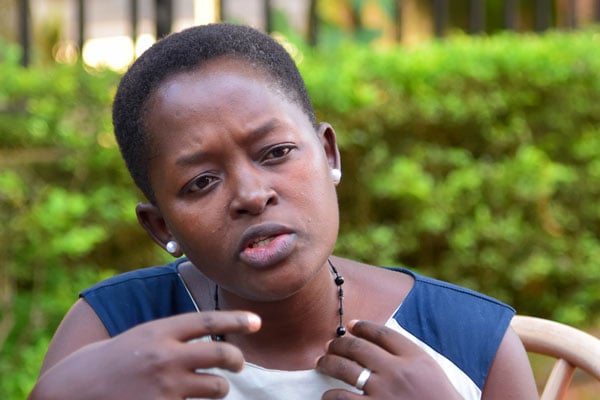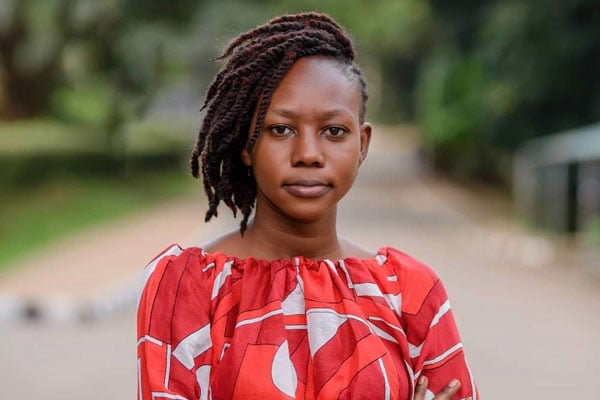Prime
‘Doctors gave me a month, I am counting years’

Orikiriza has a reason to smile. PHOTO/FRANK BAGUMA
What you need to know:
- In 2021, Rusia Orikiriza Bariho, was diagonised with breast cancer. From paralysis to several other infections, she has undergone a spinal surgery and reconstruction, radiation, and numerous integrated cancer therapies that gave her a new lease of life.
“At the hospital bed in the ward, I eavesdropped a conversation, where the nurses were advising my husband to allow me to sign off powers of attorney, to ease the process of transferring property in his name,” says Rusia Orikiriza Bariho.
Memories of nurses telling her husband to take her home to await her death are still fresh in Orikiriza’s mind. Given a few months to live, coupled with paralysis, Orikiriza still hoped that she would have another chance at life.
Orikiriza,37, is a mother of four, a budding entrepreneur and the founder of Oribags Innovations Limited, a business enterprise that deals in waste recycling and manufacturing of environmentally-friendly gifts packaging and stationery products in Uganda.
At the start of 2022, Orikiriza was diagnosed with stage four breast cancer that had spread to various parts of her body.

Orikiriza celebrates her victory with her husband. PHOTOS/FRANK BAGUMA
In December 2021, Orikiriza’s husband had discovered a small lump on his wife’s breast, but since it did not cause any pain, the couple did not pay attention it. This would later become breast cancer.
Paralysis and depression
Upon their return from the village where they had gone for Christmas celebrations, Orikiriza discovered that the lump was increasing in size.
When they got to the hospital, it was discovered that she had cancer. For a moment, Orikiriza says it felt like a dream but reality hit when she could not walk or even stand.
Having nursed one of her domestic workers who succumbed to cancer a few years ago, Orikiriza had an idea of what awaited her.
At the time when the diagnosis was done, Orikiriza had a four-month-old baby then, and knowing that her child would be orphaned any time soon, depressed her.
Orikiriza says she refused to go home and instead asked her husband to take her to a rehabilitation centre. She stayed here for two weeks and was later taken back home.
For two weeks, Orikiriza suffered from insomnia. She says besides treating breast cancer, she had to deal with a new complication every week.
“Eating became a challenge. Before diagnosis, I was 91 kilogrammes and within three weeks, I had lost 10 kilogrammes. I developed almost 15 infections within the first month,” she says.
As she kept losing weight, the lump increased in size, even though it was painless.
In fear of stigma, Orikiriza said she isolated herself and did not want to break this news to any of her friends or relatives. “How do you call your friend and tell them you have been diagnosed with cancer?”
According to her, they would never look at her as the budding entrepreneur and mother they once knew. The hospital, she says, became her new home.
“I started visiting the hospital every day; treating cough, the next morning you treat a UTI because the body’s immunity had deteriorated and this is what killed me more,” she says.

Orikiriza has a reason to smile. PHOTO/FRANK BAGUMA
Orikiriza sought solace in visiting breast cancer patients. She says only those would understand her condition.
According to Orikiriza, attitude is a powerful tool in leading any patient to their early grave. She says: “Every time I got a negative thought, I contracted another infection.
Finding hope online
Attention shifted from breast cancer and she started treating side effects of depression, until she started reading cancer related articles online.
She says this helped her fact check opinions from survivors, doctors and experts in the cancer field and she discovered more information on the kind of treatment she was given.
While she kept the news to herself, people in her circles had started speculating. “Some said I was suffering from TB. Others claimed it was witchcraft. Others thought it is nutrition deficiency,” she recalls.
Desperate to heal, Orikiriza says whatever she was told treats cancer, she tried it out. But this grounded her immunity. She went back to making several hospital visits and was given a different diagnosis every time she consulted a new doctor.
“At one point, they diagnosed something called disc prolapse,” she says.
Prolapsed disc sometimes referred to as slipped disc according to patient.info, often causes sudden, severe lower back pain. The disc often presses on a nerve root, which can cause pain and other symptoms in a leg.

Orikiriza spent a year in a wheel chair.
In most cases, the symptoms ease off gradually over several weeks. Painkillers may help and in other instances, physical treatments such as spinal manipulation may come in handy. Surgery may be an option if the symptoms persist.
Any disc in the spine can prolapse. However, most prolapsed discs occur in the lower back. The size of the prolapse can vary. The larger the prolapse, the more severe the symptoms are likely to be.
Who gets a slipped disc?
Bouts of back pain are very common. However, fewer than 1 in 20 cases of sudden-onset (acute) back pain are due to a ‘slipped’ (prolapsed) disc.
(Most cases of back pain are classed as simple low back pain. This is thought to be caused by a minor problem in a muscle, ligament, or other structure in the back - for example, a strained muscle
The most common age to develop a prolapsed disc is between 30 and 50 years. Twice as many men as women are affected. A prolapsed disc is rare in anyone under 20 years of age.
Orikiriza started treating disc prolapsed which she later found out was a wrong diagnosis and it was already cancer in the bones.
On July 3, 2022, Orikiriza fainted at her home, was rushed to the hospital and was bedridden for months.
“When we went to some hospital, they told my husband to take me home because from the MIR tests, they had observed that some bones could not be seen. “The doctor asked if I had an accident because some bones were not there. I was advised to seek the services of an orthopediatrician.
Orikiriza says she lost about 45 kilogrammes, her hair kept falling off, developed wounds, lost appetite, spent close to a year confined to a wheel chair and her sexual life was greatly affected for more than a year. She adds that cancer was spreading to her liver, breasts, pelvic bones and her spine.
Her mind fought on
Orikiriza was dying slowly, friends and family started praying for her. She went home to wait for her time. Although her body had lost the battle, her mind, she says, was still fighting.
“There is hope even when people write you off. The fact that I am alive today is a miracle itself. I was positive. I had hope that I would walk again,” she says. Her dream became a reality on August 29, 2022. It is on this day that Rusia managed to stand again. But this celebration was short-lived. She would later become unconscious.
Orikiriza’s family took a leap of faith and took her to India for further management. She underwent a spinal surgery and reconstruction, radiation, targeted therapy and numerous integrated cancer therapies that gave her a new lease of life. She spent more than two months in India while on treatment.
Orikiriza attributes her healing and recovery to the resilient care and emotional support by her husband, who never gave up on her despite several negative forces from numerous people.
Her trust in God, a specific diet, power of music and other additional therapies also eased her healing process.
“Battling cancer at whatever stage is a very humbling experience. It is important to have positive people around you. Positivity and believing that you will get through the hardest days with cancer are critical. Live life as it comes,” she says.

Coping methods
She decided to record a song to encourage and support all those battling cancer and other complicated diseases. She also reignited her dancing hobby, which she says, gave her hope through the darkest days. She has since become a nutritional freak. She is careful about what she eats. Orikiriza also warns people against eating hot food from a polythene bag.
As Uganda celebrated World Environment Day on June 5, the executive director of National Environment Management Authority (NEMA), Dr Akankwasa Barirega, warned about polythene bags, saying they are cancerous.
According to him, micro plastics are now being detected in human blood and breast.
In an interview with this publication, Dr Alfred Jatho, a community cancer Health Educator, as well as the head of community cancer services department, Uganda Cancer Institute, warned against the same. According to him, covering or serving hot food from polythene bags, exposes one to cancer related risks because of the chemicals used in making these polythene.
Orikiriza periodically goes for medical review in India. She says treating cancer here in Uganda and even abroad is too costly and urges women to examine their breasts and go for regular cancer check-ups. “Pain comes when the cancer stage has advanced,” she adds. She commends Dr Paul Kasenene for supporting her nutritional journey while she battles with cancer.
“I have resumed work and I can drive. I take my children to school and I feel better. I am on a strict diet,” Orikiriza speaks about her progress.





